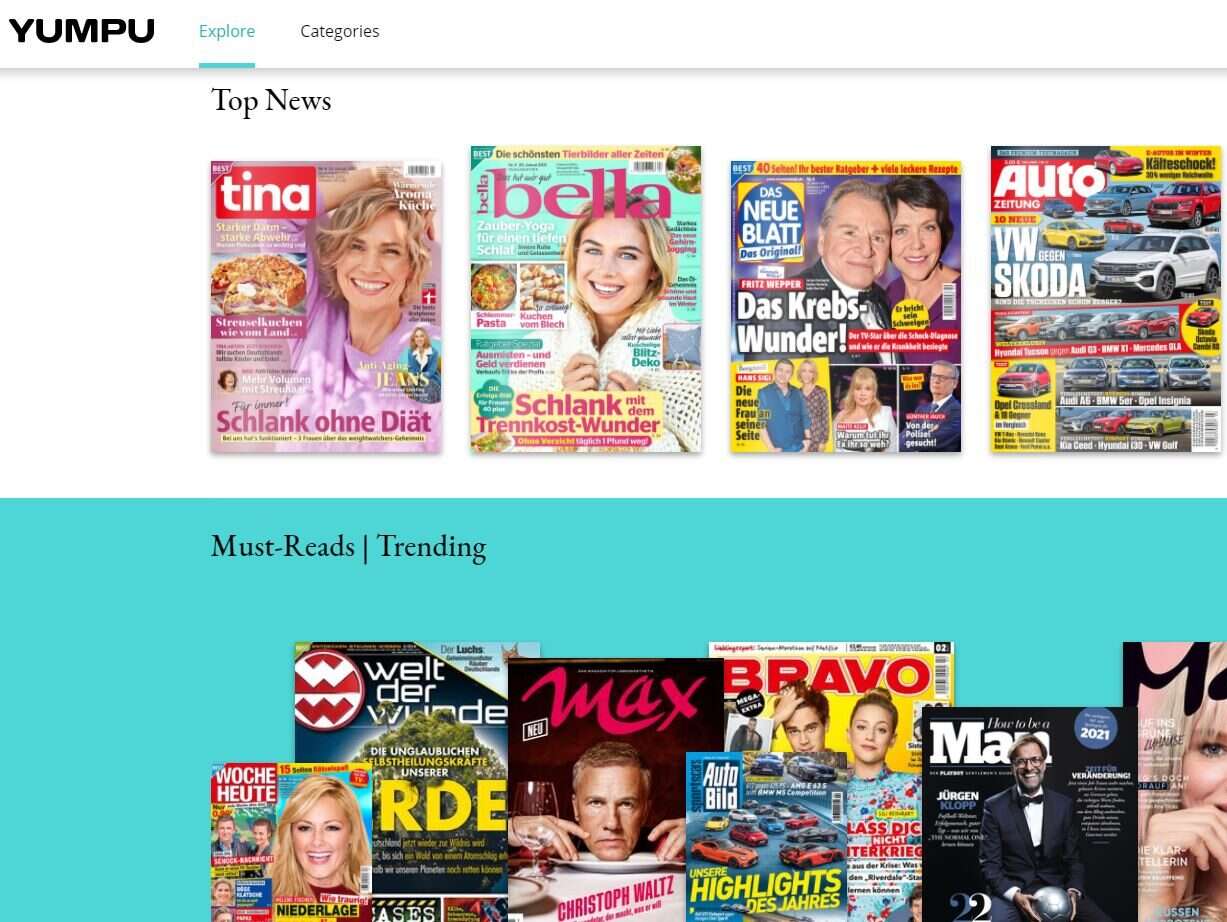
Yumpu News is the latest platform to put itself forward as a “Spotify for publishers”, but with a revenue-sharing model that it claims puts the music streaming giant to shame.
Yumpu (a contraction of yummy publishing) is originally a tech company that offers premium digital page-turning software for publishers. Now it is putting its proprietary software to use to build a digital newsstand.
Yumpu News will arrive in the UK on 1 February, marking its first major expansion since launching in Germany and Austria a year ago, which are the only other markets it serves.
The new platform claims to have already signed up 95% of the UK publishing market, covering not just magazines but newspapers too, setting it up as a direct rival to the likes of Readly, Pressreader and Cafeyn.
[Read more: Could a Spotify-style model save the global newspaper and magazine industry?]
It hopes to set itself apart from the competition through the quality of its page-turning software and the number of newspapers that it offers users on its digital newsstand.
From launch it said it will offer more than 500 titles from 50 publishers, including regional and national newspapers, mainstream and specialist magazines, and business titles.
The basics
Yumpu News is owned by i-Magazine, which is part of the Adrom group, a technology, data and email marketing business based in Switzerland.
The platform is available on desktop and mobile apps (iOS and Android).
| Yumpu News | |
| What is it? | ‘Spotify for publishers’ |
| Where is it available? | Desktop and mobile apps in UK from 1 February 2021 |
| How much does it cost readers? | £7.99 a month |
| Audience size? | 500+ titles |
| Publications on board? | ‘95% of UK publishing market’ |
| Pros for publishers? | Revenue and data sharing |
| Cons for publishers? | Only been tested in Germany/Austria so far |
How it works
Yumpu News uses an algorithm to determine which titles subscribers are reading, how long they spend reading them, where they’re based and whether they’ve signed up for notifications etc.
There is as yet no editorial team in the back-office either curating the platform or promoting stories.
Publishers also get access to analytical data on their readers on the platform, although this does not extend to sign-up details.
In what may be a first for a page-turning news platform, all content on Yumpu News is Google searchable.
“That makes magazine content open and available to a whole new audience,” said Max Barnes, who is heading up the UK launch. “Whereas if it just existed on an app, you’d be very reliant on the subscribers on the platform to discover the content.
“This way people will come to it via Google, as well as subscribers who are already on the platform.”
Show me the money
Yumpu News is funded by subscriptions, which in the UK will cost £7.99 a month for “all you can read”. Each subscription includes five user licences that can be shared with friends and family.
The platform will not run third-party advertising, relying solely on revenue from subscriptions which will be split 70:30 in favour of publishers. A user’s monthly fee is split between the titles they read and is further divided by how long they spend reading them and other metrics.
This means that if a subscriber does not read a particular title, that title would not receive any payment out of their monthly subscription fee, unless and until they start reading the title.
Barnes said: “We’ve tried to make it a fairer system where publishers are able to see… how many people have been reading their magazines, how long they’ve been spending on them, where they’re based, and all these interesting metrics that help them understand how their magazines are working and then they get a revenue out of it – and they don’t pay for it.”
There are no fees for publishers to join or set-up costs. All titles will be converted to Yumpu’s own page-turning software for the platform. Yumpu News will be ABC-certified from 1 April 2021.
Verdict
Yumpu News arrives in the UK at a time when the traditional journalism model is challenged due to the coronavirus. It provides another outlet for titles, such as the Evening Standard, whose print-centric business models have been savaged by lockdown restrictions.
With a revenue-sharing model that differs from other platforms, it offers an interesting proposition to publishers that is an alternative to the long-declining physical newsstand.
Barnes sums it up: “Nine months ago people were quite fearful of third-party platforms. The word cannibalising revenues was like this elephant in the room. But with the coronavirus lockdown situation, the mood of publishers has changed and they’ve become a lot more receptive to working with us.
“The physical newsstand is in decline anyway – and has been since 2011 – and because routes to market for free titles like Evening Standard and Stylist [have been disrupted] as there aren’t commuters going off on the Tube to work, they’re looking for the life raft from the Titanic.”
Picture: Yumpu News
Email pged@pressgazette.co.uk to point out mistakes, provide story tips or send in a letter for publication on our "Letters Page" blog
